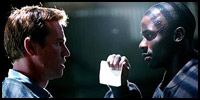
 |
|
Spartan (2004) Cast: Val Kilmer, Derek Luke, Tia Texada, Kristen Bell, William H. Macy, Ed O'Neill, Aaron Stanford, Natalia Nogulich, Clark Gregg, Said Taghmaoui, Mark Pellegrino, Kick Gurry, Lionel Mark Smith, Tony Mamet, Johnny Messner, Chris LaCentra, Geoffrey Pierson, Andrew Davoli, Lana Bilzerian 2004 – 106 minutes Rated: Reviewed by Dustin Putman, March 13, 2004.  It is always a treat to see the latest feature film from writer-director David Mamet, he of the famously literate and sly dialogue exchanges. Some efforts are more uneven than others, and lately he has come close to repeating himself (1998's "The Spanish Prisoner," 2001's "Heist," and "Spartan" share genre similarities), but Mamet has style to spare and knows exactly how to create an arresting narrative and on-the-nose characters without ever having to spoon-feed the plot to viewers. He trusts the intelligence of his audience, which is one of the most admirable attributes in a filmmaker who, despite his high points in writing and creating atmosphere, isn't always sure how to bring all the elements together for a home run.
It is always a treat to see the latest feature film from writer-director David Mamet, he of the famously literate and sly dialogue exchanges. Some efforts are more uneven than others, and lately he has come close to repeating himself (1998's "The Spanish Prisoner," 2001's "Heist," and "Spartan" share genre similarities), but Mamet has style to spare and knows exactly how to create an arresting narrative and on-the-nose characters without ever having to spoon-feed the plot to viewers. He trusts the intelligence of his audience, which is one of the most admirable attributes in a filmmaker who, despite his high points in writing and creating atmosphere, isn't always sure how to bring all the elements together for a home run.
 Like David Mamet's last (and weakest) film, "Heist," "Spartan" is a plot-heavy thriller boiling over with unforeseen developments and surprising revelations. Unlike "Heist," however, which quickly grew monotonous in the way it relentlessly jerked you around for no good reason other than because it could, the twists in "Spartan" serve a purpose, and stem naturally and believably out of the situations rather than as mere script contrivances. Mamet throws you into the midst of the story from the very beginning without any textural explanation and dares you to figure all of the details out on your own. It is all very enthralling and perplexing, clear enough for one to understand the premise and most of the goings-on, but vague enough in its interplay that a second viewing could only enrich the experience the movie has to offer.
Like David Mamet's last (and weakest) film, "Heist," "Spartan" is a plot-heavy thriller boiling over with unforeseen developments and surprising revelations. Unlike "Heist," however, which quickly grew monotonous in the way it relentlessly jerked you around for no good reason other than because it could, the twists in "Spartan" serve a purpose, and stem naturally and believably out of the situations rather than as mere script contrivances. Mamet throws you into the midst of the story from the very beginning without any textural explanation and dares you to figure all of the details out on your own. It is all very enthralling and perplexing, clear enough for one to understand the premise and most of the goings-on, but vague enough in its interplay that a second viewing could only enrich the experience the movie has to offer.
 Robert Scott (Val Kilmer) is a "lone wolf" secret-agent-cum-government-trainer who is recruited to secretly investigate the disappearance of Laura Newton (Kristen Bell), the 18-year-old daughter of the President, in her college town of Cambridge, Mass. With the help of rookie agents Curtis (Derek Luke) and Black (Tia Texada), Scott's mission leads him down an unexpected and dangerous path—one involving kidnapping, prostitution, government cover-up, and political corruption.
Robert Scott (Val Kilmer) is a "lone wolf" secret-agent-cum-government-trainer who is recruited to secretly investigate the disappearance of Laura Newton (Kristen Bell), the 18-year-old daughter of the President, in her college town of Cambridge, Mass. With the help of rookie agents Curtis (Derek Luke) and Black (Tia Texada), Scott's mission leads him down an unexpected and dangerous path—one involving kidnapping, prostitution, government cover-up, and political corruption.
 For those walking into "Spartan" without any knowledge of the premise, it doesn't even become clear until midway through that the missing girl is the President's daughter. The characters speak in undercover jargon, just as they would if the situation was occurring in real life, and Mamet methodically peels back the layers of the plot little by little until the full story is finally disclosed solely out of their actions. It is certainly a tricky way to handle cinematic storytelling, but it works because the viewer is forced to be attentive and actively involved in what they are watching on the screen.
For those walking into "Spartan" without any knowledge of the premise, it doesn't even become clear until midway through that the missing girl is the President's daughter. The characters speak in undercover jargon, just as they would if the situation was occurring in real life, and Mamet methodically peels back the layers of the plot little by little until the full story is finally disclosed solely out of their actions. It is certainly a tricky way to handle cinematic storytelling, but it works because the viewer is forced to be attentive and actively involved in what they are watching on the screen.
 It helps, too, that the jerky, always unanticipated plot developments feel natural in the way they come about. The lame mystery at work in the recent "Twisted," for example, never came off as anything more than a clumsy screenwriting device, whereas in "Spartan" they vibrate off the screen with urgency and originality. And even when a particular twist or two appears far-fetched, further contemplation on the how's and why's of them expose notions that are frighteningly plausible. This is no more true than in the film's provocative commentary on politics, and the cutthroat lies that go along with saving a political figure's skin and deceiving the public for personal gain.
It helps, too, that the jerky, always unanticipated plot developments feel natural in the way they come about. The lame mystery at work in the recent "Twisted," for example, never came off as anything more than a clumsy screenwriting device, whereas in "Spartan" they vibrate off the screen with urgency and originality. And even when a particular twist or two appears far-fetched, further contemplation on the how's and why's of them expose notions that are frighteningly plausible. This is no more true than in the film's provocative commentary on politics, and the cutthroat lies that go along with saving a political figure's skin and deceiving the public for personal gain.
 Less satisfying is the lacking human element in "Spartan." The hero, Robert Scott, played with commanding presence by the always reliable Val Kilmer (2003's "Wonderland"), is in nearly every scene, but little is ever made known about his beliefs, his feelings, and his background. The same goes for almost all the characters, including Ed O'Neill (2000's "Lucky Numbers") and William H. Macy (2003's "The Cooler") as a pair of government officials, and Tia Texada (2003's "Phone Booth") and Derek Luke (2003's "Pieces of April") as the rookies enthusiastically working under Scott's wing. These figures, while potentially interesting, never break out from the confines of the plot to become flesh-and-blood individuals. The near absence of any palpable human connection makes for a rather cold outcome when all is said and done, one that is effective because of the points the movie makes and frustrating because there is no one to truly care about.
Less satisfying is the lacking human element in "Spartan." The hero, Robert Scott, played with commanding presence by the always reliable Val Kilmer (2003's "Wonderland"), is in nearly every scene, but little is ever made known about his beliefs, his feelings, and his background. The same goes for almost all the characters, including Ed O'Neill (2000's "Lucky Numbers") and William H. Macy (2003's "The Cooler") as a pair of government officials, and Tia Texada (2003's "Phone Booth") and Derek Luke (2003's "Pieces of April") as the rookies enthusiastically working under Scott's wing. These figures, while potentially interesting, never break out from the confines of the plot to become flesh-and-blood individuals. The near absence of any palpable human connection makes for a rather cold outcome when all is said and done, one that is effective because of the points the movie makes and frustrating because there is no one to truly care about.
 Almost no one, that is. Newcomer Kristen Bell is a standout as the kidnapped Laura Newton, shading her character with a misunderstood sorrow that adds real depth to her late scenes with Scott. The relationship that quickly develops between Laura and Scott near the end is a high point, as these two people listen and understand each other, and even come to sympathize with the other's dire plight. "Spartan" could have almost been about them together and might have been a superior film because of it.
Almost no one, that is. Newcomer Kristen Bell is a standout as the kidnapped Laura Newton, shading her character with a misunderstood sorrow that adds real depth to her late scenes with Scott. The relationship that quickly develops between Laura and Scott near the end is a high point, as these two people listen and understand each other, and even come to sympathize with the other's dire plight. "Spartan" could have almost been about them together and might have been a superior film because of it.
 "Spartan" is a technical achievement, impressive for the things it does well and unfortunate that so much more might have been improved. The Mamet dialogue, always counted on to be snappy and quirky and cleverly incendiary, isn't as memorable as usual, and the conclusion doesn't emotionally resound as much as it could have had the characters not been kept at a distance from the audience. Nonetheless, as nothing more than a stylistic exercise in tight plotting and tension, it is first-rate, with moody cinematography by Juan Ruiz Anchia (2003's "Confidence") so indelibly rich it borders on Hitchcockian. Warts and all (and there are more than I would have preferred), "Spartan" holds a freshness and spontaneity rarely found in the thriller genre.
"Spartan" is a technical achievement, impressive for the things it does well and unfortunate that so much more might have been improved. The Mamet dialogue, always counted on to be snappy and quirky and cleverly incendiary, isn't as memorable as usual, and the conclusion doesn't emotionally resound as much as it could have had the characters not been kept at a distance from the audience. Nonetheless, as nothing more than a stylistic exercise in tight plotting and tension, it is first-rate, with moody cinematography by Juan Ruiz Anchia (2003's "Confidence") so indelibly rich it borders on Hitchcockian. Warts and all (and there are more than I would have preferred), "Spartan" holds a freshness and spontaneity rarely found in the thriller genre.
|
© 2004 by Dustin Putman |














